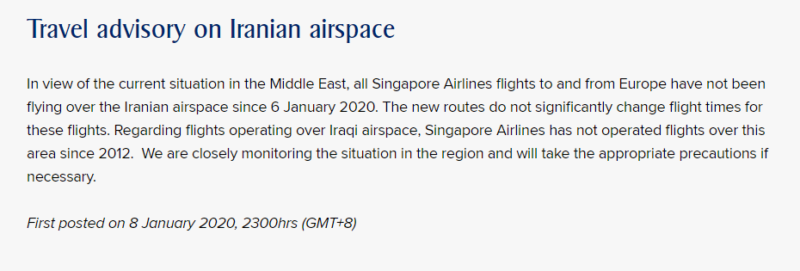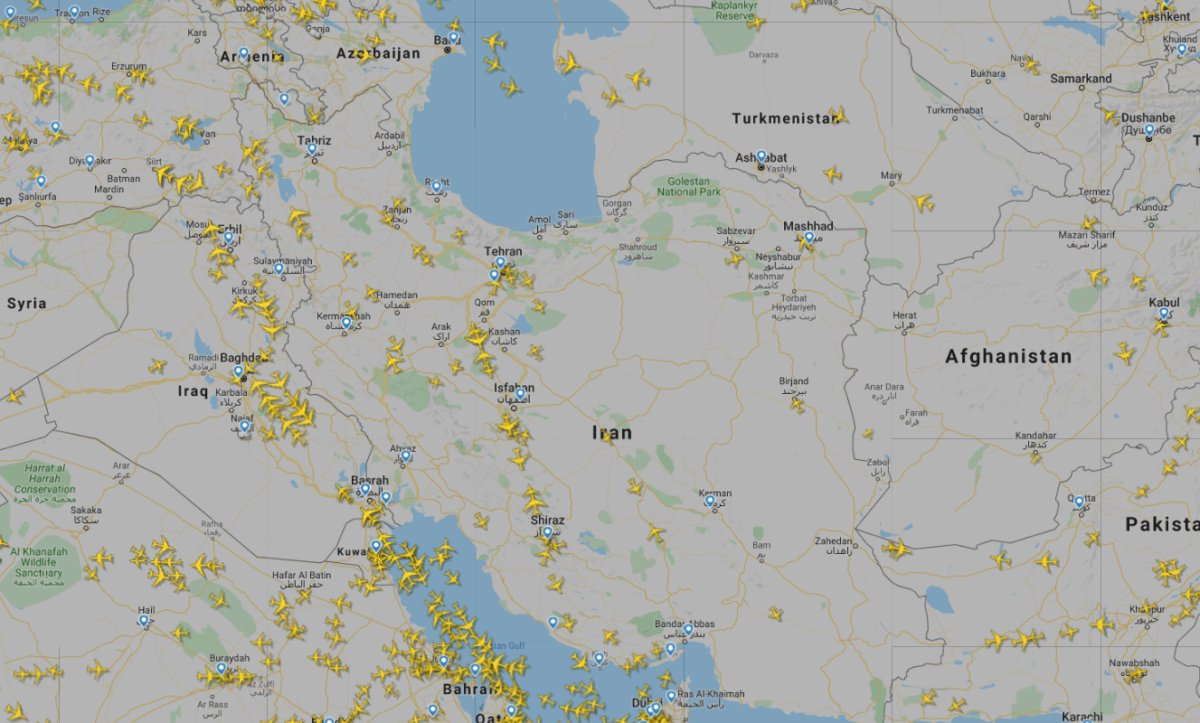Multiple airlines around the world have made adjustments to their flight routes, following the launch of missiles across Iranian and Iraqi airspace; this has prompted questions about flight safety for passengers, crew and aircraft.
As of Thursday the 9th of January, here are the airlines/regulators that have issued statements about flying through the heated airspace:
United States of America
The Federal Aviation Administration (FAA) recently published a notice to airmen (NOTAM) stating that American pilots and airlines are not to fly in areas over Iraq, Iran and parts of the Persian Gulf. This is to prevent commercial aircraft from being confused with aircraft engaged in armed conflict.
#FAA Statement: #NOTAMs issued outlining flight restrictions that prohibit U.S. civil aviation operators from operating in the airspace over Iraq, Iran, and the waters of the Persian Gulf and the Gulf of Oman. pic.twitter.com/kJEbpPddp3
— The FAA (@FAANews) January 8, 2020
Qantas/Civil Aviation Safety Authority
The Australian Civil Aviation Safety Authority (CASA) does not have the same amount of jurisdiction as the FAA, meaning airlines decide for themselves whether they want to fly over the flagged airspace.
Qantas has announced that flights over Iraq and Iran will be re-routed until further notice, meaning that their QF9 and QF10 direct service between Perth and London is the only affected flight.
Consequently, Qantas has re-routed the Boeing 787-9 Dreamliner, responsible for operating this flight to track over Afghan airspace, adding 40 to 50 minutes to the 17 hour flight.
Qantas also rerouting to avoid Iran and Iraq airspace. #QF9 and #QF10 between London and Perth seeing significant changes to their flight plans.
— Flightradar24 (@flightradar24) January 8, 2020
QF9: https://t.co/fAp4Xj3zmG
QF10: https://t.co/WM5HYJeVYl pic.twitter.com/Qb5YI9P4vA
Since the aircraft is already close to its operating limits Qantas will have to cut a whopping 90 passengers from the Perth to London flight, just to save weight and reduce fuel burn. However, favourable winds on the way back mean a full load could be carried.
A fuel stop is being considered in either Hong Kong or Singapore, which would allow for a full passenger load but would drastically increase travel time for passengers and crew.
Qantas told media that none of their aircraft were flying in the airspace at the time of the missile launches.
Emirates and Flydubai
Emirates and Flydubai both cancelled flights to Baghdad following Wednesday’s missile launches, they have said further operational changes would be made if necessary.
“We are carefully monitoring the developments and are in close contact with the relevant government authorities with regards to our flight operations, and will make further operational changes if required.”
Emirates
Lufthansa
Lufthansa has dropped its next scheduled flights to Erbil in Northern Iraq and to Tehran, but would resume flights to the capital on Thursday.
Flights that usually track through the airspace to get to other locations will be re-routed.
Air France-KLM
Although Air France-KLM terminated flights to Tehran in 2019, the group has said Air France flights will be avoiding Iranian and Iraqi airspace as a precautionary measure.
Other Operators
Singapore Airlines said all of their flights would be diverted away from Iranian airspace, as a result of the attacks, whilst Malaysia Airlines said they did not fly over Iraq but would move flights out of Iranian airspace.

China Airlines noted the rising tension in the area was the deciding factor to stop flying over Iraq and Iran; whereas Korean Airlines and Thai Airways had previously been avoiding Iranian and Iraqi airspace, well before the attacks on Wednesday.
Transport Canada said it was closely monitoring the situation with the FAA; they have stated that Air Canada has already begun altering routes to avoid the airspace.
Air Canada, the only Canadian air carrier that operates in the region covered by the FAA NOTAM, has altered its routes to ensure the security of its flights into and over the Middle East
— Transport Canada (@Transport_gc) January 8, 2020
India’s aviation regulator has not issued any guidelines to airlines about the airspace, however it is being reported that meetings have been held with those concerned about the tension. Flight crew as well as the airlines have been told to remain vigilant and take necessary precautions.
British Airways says a small number of flights are affected, but has yet to explain their complete operations changes.
Qatar Airways flights will continue as normal to Iraq.
Reuters reports that as of 08:30 GMT airlines still flying over either country include Qatar Airways, Emirates, Turkish Airlines, Flydubai, Air Arabia and Norwegian Air, according to Flightradar24 data.
Adjustments to this post will be made as airlines continue to assess the situation.


